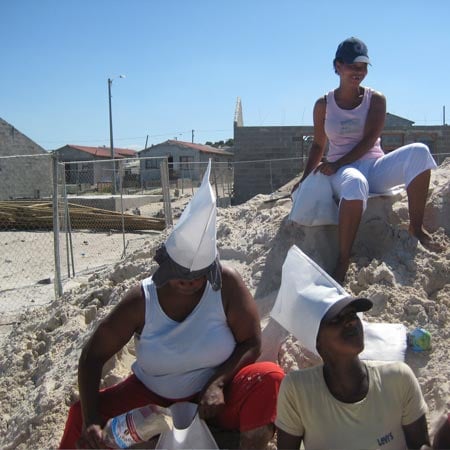Design Indaba 08: Cape Town architects MMA have started work on a pilot project of ten affordable houses built using a sand-bag construction system.
Each house, being built at Freedom Park at Cape Flats on the outskirts of Cape Town, has a budget of just 65,000 Rand (£4,300/$8,600).
Work started on site yesterday (Monday) and the first house should be substantially finished by the end of the week. These photos show construction of a demonstration wall on the site using the sand-bag system that took place on Sunday.
Above: Luyanda Mpahlwa of MMA architects. Below: women from Freedom Park filling sand bags.
The houses will be donated to former shack dwellers with the first house going to the Jonkers family, who have until now been living in a single-room tin shack.
The sand-bag system, developed by a Cape Town company called Eco-Beam, allows communities to build their own homes using extremely cheap materials.
In this case, the sand comes from dunes located a few hundred metres from the construction site and the bulk of the manual labour is being carried out by women from the Freedom Park community.
The project is part of the 10x10 housing project initiated by Design Indaba, which pairs ten teams of South African architects with international designers to pioneer new affordable housing systems. See Dezeen's story from last year for more info.
MMA Architects were initially paired with London architect Will Alsop, although Alsop has not been involved in the final design of the houses.
Here's a press release from Design Indaba:
--
Design Indaba’s 10x10 Housing Project is pleased to announce that building has started on the designated plots in Freedom Park. Launched at last year’s Design Indaba, the 10x10 Housing Project challenged 10 architectural teams to provide innovative and dynamic design solutions for the low-cost housing sector.
Ten of the first solution will be built in this first phase of the project, thanks to sponsorship from PG Bison and Pennypinchers. Future constructions involving the other nine designs are envisioned.
Said Justin Berry, group marketing manager of PG Bison: “As a leader in the South Africa’s building industry, PG Bison is proud to be part of a project that proposes a meaningful solution to the housing problem in South Africa.”
The solution to be implemented is the entry from architect Luyanda Mpahlwa, assisted by Kirsty Ronné. Using an innovative new building system, Ecobeams, which complies with all the rules and regulations of the Cape City Council, fits within budget and fulfils all the requirements with regards to testing and certification of an alternative building system.
"To be part of this project meant a lot in terms of making a significant contribution towards innovative, dignified solutions to the housing situation. I'm looking forward to seeing the final construction," said Mpahlwa. The design also offers a number of improvements on the standard RDP house. Ecobeams are equal, if not superior, to brick-and-mortar, but cheaper and more eco-friendly.
Taking this into account Mpahlwa has increased the size of the house and created a fluid interplay between public and private spaces in and around the house. The house is also built on a framework, making it easy to expand, and involves the whole community in its construction.
The design, and those of the other architects from around the world will be distributed as architectural open source. “All of these designs will bring new materials and concepts to low-cost housing, and will be an absolute boon to poor families across Africa,” said Ravi Naidoo, founder of Design Indaba and director of Interactive Africa.
The participating architectural teams are: Jo Noero (Cape Town) and Cameron Sinclair (San Francisco); Vanessa September (Cape Town) and Lindy Roy (New York); Luyanda Mpahlwa (Cape Town) and Will Alsop (London); Andrew Makin and Janina Masojada (Durban), and Christoph Egret (London); Lesley Carstens and Silvio Rech (Johannesburg), and Thomas Heatherwick (London); Stefan Antoni (Cape Town) and Eva Jiricna (London); Ruben Reddy (Durban) and Mark Dytham (Tokyo); Martin Kruger (Cape Town) and David Adjaye (London); Henning Rasmus (Johannesburg) and Shigeru Ban (Tokyo); and Don Albert (Cape Town) and Tom Dixon (London).

